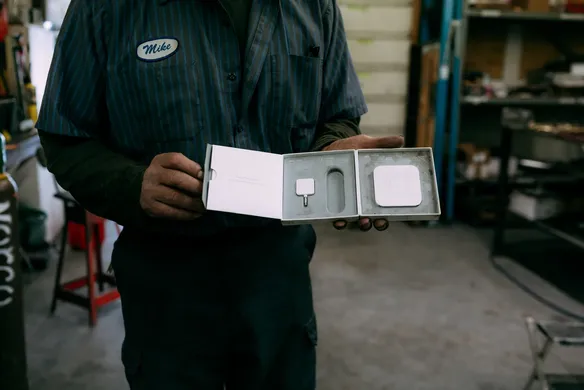Table of contents
Are you someone who prefers hands-on work? Are you an entrepreneur? Are you looking for a powerful career? If you answered ‘yes’ to all the above, you might consider starting an electrical business.
We’re more reliant on electricity than we’ve ever been and our power dependency is only set to increase into the future. This makes an electrical contractor business one with incredible growth potential.
As the owner of an electrical business, you’ll provide electrical services to anyone who needs them: homeowners, businesses, government agencies, nonprofits and more. Electrical systems and devices can be dangerous if not properly installed or maintained, so an electrical business comes with a lot of responsibility. But if you’re interested in the field and have a deep desire to run your own company, the risk will be more than worth the reward.
For those considering this path, you’ll need to know how to start an electrical business. Read on to find out.
The benefits of starting your own electrical business
Before we dive into how to start an electrical contractor business, we should first understand the ‘why’. Why should you choose this form of business over another? Owning an electrical business brings a number of benefits:
There’s plenty of work: As our society develops our reliance on energy increases. There’s already plenty of work available, and electricians will only become more important and more valued into the future. This is one of the safer business opportunities available to you.
Electricians are paid well: Because electrical expertise is highly sought after, electricians earn more than most other common trades, including plumbers, carpenters and bricklayers.
You get to work with your hands: You don’t have to be stuck in an office (unless you’d like to be!) Until your business grows to a certain point, you’ll be able to work out in the field with your hands.
You steer your own future: As a business owner you’ll enjoy far greater control over your life. What you do with your business – the shape it takes, the size it grows to, how it is run, when and how much you work – is totally up to you!
Requirements to start an electrical business
What skills, qualifications, permits and licences will you need to start your electrical business? Let’s take a look at the main considerations.
Skills and knowledge
To become a fully qualified electrician you’ll need to earn a trade. This is usually done by undertaking a four-year apprenticeship, which sees you learning within someone else’s business and going to trade school.
An apprenticeship arms you with general electrical knowledge – enough to take care of installation, maintenance and repair tasks on things like electrical wiring in buildings, transmission lines, machines and equipment. From there an electrician can gain further qualifications to work in specialist fields, such as:
- Data and security systems
- Solar panel and renewable energy systems
- Electric vehicle charging stations
Electrical contractor’s licence
In order to own an electrical business you not only need to gain an electrical trade, you also need to hold an electrical contractor’s licence. The authorities in charge of distributing these licences change from state to state, and are listed below:
- NSW: Fair Trading
- VIC: Energy Safe Victoria
- QLD: WorkSafe
- SA: State Government
- WA: EnergySafety
- TAS: Department of Justice
- ACT: Environment and Planning
- NT: Electrical Workers and Contractors Licensing Board
As you’ll see by following the links above, some states don’t require much more than a trade certificate to gain an electrical contractor’s licence. Other states require more boxes to be ticked, such as police checks and proof of the necessary finance/insurance.
Once you’ve attained your contractor’s licence, you can then go about setting up your business.
Business registration
Like any business owner, you’ll need to register your electrical enterprise by obtaining an Australian Business Number (ABN) or an Australian Company Number (ACN). While more complex to set up, a company structure helps to shield you from liabilities associated with your business, so most electrical business owners choose to obtain an ACN.
Insurance for electrical businesses
Insurance is a key consideration in an electrical business, as working with power is inherently risky (though this risk drops dramatically if you do things by the book.) You need to think about public liability, worker injuries, equipment damage, theft, fire, and a wealth of other potential issues.
Many insurers offer trade-specific coverage, which tends to insure against the following:
- Product and public liability to guard against negligence resulting in property damage or personal injury.
- Fire, flood and other adverse events.
- Theft of money or other assets.
- Damage to your premises or other assets.
Essential equipment needed to start an electrical business
Speaking of equipment, what gear do you need to buy to kit out your new business? The answer will depend on the type of work you plan to undertake, but here is a basic list:
- Power tools: Drills, grinders, wall chasers, soldering/welding equipment.
- Hand tools: Insulated screwdrivers, pliers, spanners, cutters, wire strippers, hammers, hex keys.
- Diagnostic tools: Voltage indicators, multifunction testers, micrometers.
- Consumables: Electrical tapes, soldering wire/flux/wick, single- and multi-core wire.
- Office tools: Computers, printers, scanners, phones, business software.
Market your business
Qualified, insured and equipped, it’s time for you to open. But the world of contracting is competitive, so you’ll need to conduct some savvy marketing in order to lure customers in:
- Create a website: Every business needs a website if they are to have any chance of success. The best, like those created with Square Online, will sell your services, take bookings and payments, and make you far more Googleable.
- Set up social profiles: People trust people, which is what makes social media such a powerful marketing tool. Set up profiles across the main platforms (B2B companies should focus on LinkedIn), post regularly, engage with your audience, and encourage people to leave reviews!
- Use word of mouth: It might feel old fashioned, but word of mouth continues to be the most effective form of marketing there is. Encourage your personal network to tell their friends, family and colleagues about your business, and consider offering a discount or other incentive to those who do.
How much can you charge customers?
How much will you charge for your services? Electricians can make money in two main ways: through labour and through mark-ups on products and parts. Your rates should be set at a level that customers feel is fair, but that also ensures you can cover your costs comfortably – which means an inner-city electrician will generally charge more than a country electrician.
An hourly rate of $70-$130 is around the mark for most electrical contractors, though what you charge is up to you.
How Square can help electrical businesses
Starting your own electrical contractor business is a challenging task, so at Square we aim to make it a little bit easier, with a complete suite of affordable and easy-to-use business tools.
Payment systems
- POS system: If you have your own premises, a point of sale (POS) system will allow you to take payments in the shop, and if it’s a Square POS it can do far more than that, offering loyalty rewards, tracking cash flow and managing your team.
- EFTPOS machine: Square Terminal is designed for those who don’t need all the functionality listed above. It accepts card and contactless payments instantly, securely and cost-effectively.
- Portable credit card reader: Ideal for electricians on the road – i.e. most electricians – Square Reader plugs into your phone and accepts payments through an app.
Invoicing
As an electrician you’ll need to be able to produce professional quotes and tax invoices; tasks made super simple by Square Invoices.
Online booking system
Scheduling your work can be a time-consuming task for an electrician, particularly if you do high-turnover, short-term work. Square Appointments allows your customers to book your time and make payments upfront, seriously simplifying scheduling.
That, in basic terms, is how to start a small electrical contractor business – what you do with this information is entirely up to you. If you decide to take the leap into the world of power, know that Square will be there with all the tech you need to make your new venture as smooth, enjoyable and successful as possible.
![]()











